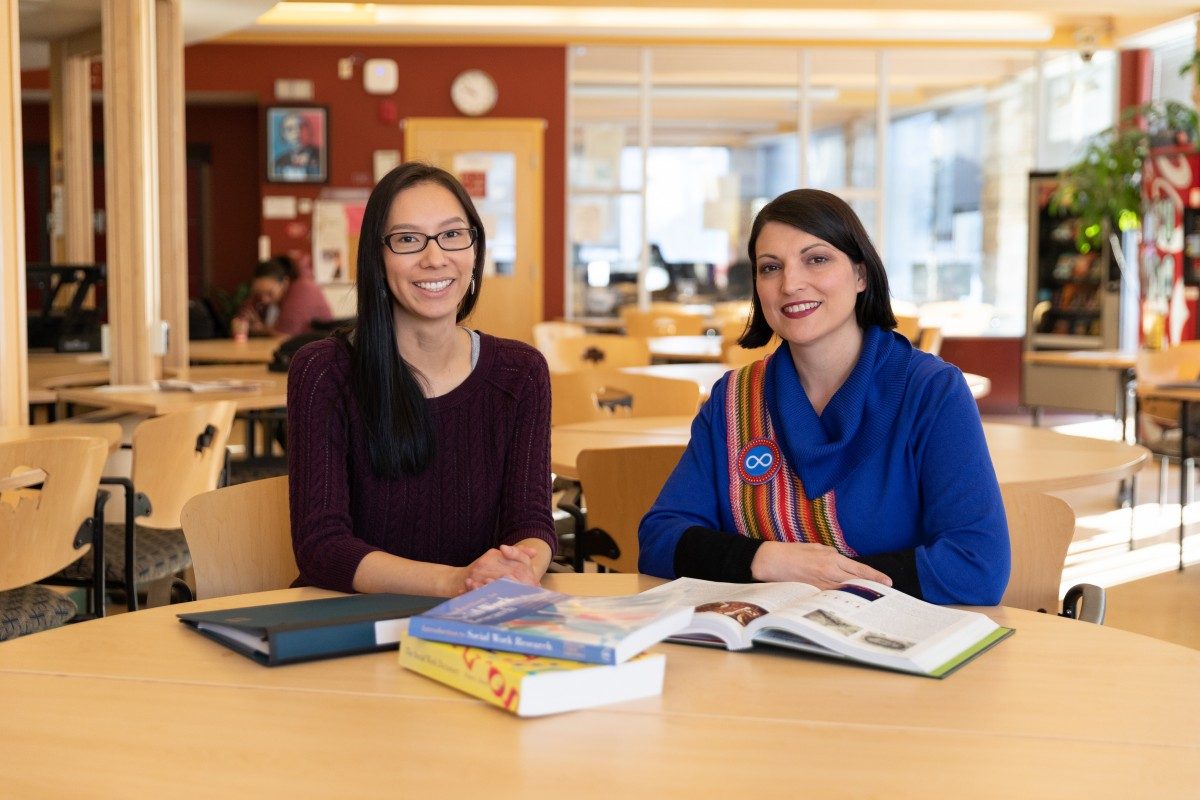
Graduate students can now access SAGE at the U of M. Photo by Adam Dolman.
SAGE program was created with Indigenous graduate students in mind
U of M alumna launches Indigenous graduate student support
With the winter term in full swing, Indigenous Student Centre’s Christy Anderson [MA/17] launched new programming at the U of M with graduate students in mind. SAGE, or Supporting Aboriginal Graduate Enhancement, provides holistic support for Indigenous graduate students at either a master’s or doctoral level of study. The idea for the program originated in post-secondary institutions in British Columbia, and Anderson tells UM Today that it has since been adopted across Turtle Island. We sat down with her to find out more about the program.
UM Today: What is the purpose of SAGE?
Christy Anderson: The whole purpose of having a program like SAGE is because graduate school can be a very daunting and arduous climb up the proverbial mountain. It can feel very lonely. Indigenous people can generally feel a bit lonely within institutional spaces, so having a place where we can gather and share space is a big part of it, too. Being alongside people who have similar goals and having the opportunity to create community helps us get through the huge task of graduate level studies.
UM Today: Tell us about the ways SAGE supports Indigenous students.
CA: The expectations in graduate programs can be high, and in this era of reconciliation, the expectation for Indigenous people to represent other Indigenous people within their faculties and in their classrooms is very prevalent, which can be an additional stressor for Indigenous grad students. This is a place where you don’t have to do that. The SAGE Café provides a space for students to relax and decompress from the busyness and demands of academia, and their own life schedules. Students can come to Indigenous spaces on campus, relax, meet other people and have a snack. I have music playing, I turn the lights down and I try and make the environment as casual and relaxing as possible. It’s a space to have conversations that might result in directing students to other places of support. It’s also nice to go to a space where you don’t have to explain yourself or represent your faculty. You can just show up and be who you are.
The writing retreats are very much the opposite of the Café. They are a structured environment to help students focus on writing. Many programs will require you to complete a thesis or dissertation, and that requires a lot of focused time and energy into writing. Almost universally, people get side-tracked, distracted, [or experience] avoidance. It can be intimidating to complete these huge writing tasks. The purpose of the writing retreat is for the students to make a commitment to themselves, and commit their time to their projects, and to support them within that environment. The Academic Learning Centre [provides] writing specialists to come into the retreats and advise them on different aspects of their writing; there is a lunch and learn opportunity to learn some different wellness strategies to help get you through the mental aspect of doing such a draining job; and then there’s the space for their physical needs, like having lunch, and coffee and snacks to sustain them during a writing period. It offers structure with the support of their peers.
UM Today: What was your experience like as a grad student?
CA: During my graduate program here at U of M, SAGE did not exist. I was lucky because my experience in the Native studies department was really supportive since I was surrounded by like-minded people. But, we didn’t get to spend a lot of time together face-to-face outside of class. As a grad student, you’re saying to yourself, “How can I possibly fit something else in when I have so much to complete and so much to do?” What I see in other SAGE programs’ research, is that when people have these support groups, a system of accountability and a community, it actually helps them finish. I almost quit because I was feeling very alone and wanted to just focus on my career. But being around people in my Indigenous community who were really supportive of my venture gave me the encouragement I needed to go forward. The value of having programming like SAGE and inviting people into a space to connect with one another is that [grad students] will find those people who want to support them and see them finish. There is encouragement to not give up.
UM Today: What is your advice to grad students?
CA: The biggest thing that I learned in my masters program was how valuable it is to have some really clear time management organization, and how to apply SMART (specific, measurable, achievable, realistic, and timely) goals into my planning. From the mistakes I made in my own graduate work, I bring this into SAGE programming. Breaking down goals and time is what really helps people complete big projects. If you break down your tasks into these SMART goals, you can get excited about completing tasks along the way, and it feels like you have momentum driving you forward towards your end goal—the completion of a thesis project. It gives you a boost in confidence and makes things manageable. My advice to all graduate students is simple: celebrate your little successes.
Christy Anderson completed her Masters of Arts in Native studies in 2017. Her thesis, “(Re)Presenting Indigenous Women: A critical analysis of two reports on missing and murdered indigenous women and girls in Canada is something she still feels proud of today. For SAGE’s schedule on Fort Garry, Bannatyne, and William Norrie Centre, visit the SAGE website or contact Christy.Anderson@umanitoba.ca.






